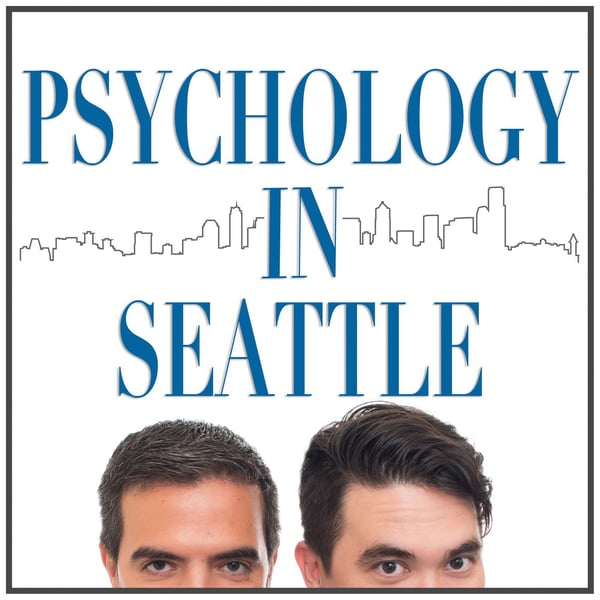Ethics Violations, Psychopathic Therapists, and Quitting Therapy
Psychology In Seattle Podcast
Kirk Honda
4.6 • 1.2K Ratings
🗓️ 21 May 2025
⏱️ 64 minutes
🧾️ Download transcript
Summary
This episode is sponsored by BetterHelp. Give online therapy a try at betterhelp.com/KIRK to get 10% off your first month.
00:00 Why do we enjoy discussing ethics?
03:00 Are psychopathy and sociopathy the same?
11:18 Umbrellas of empathy
18:12 Is shame equated to empathy?
23:17 Can therapists have personality disorders?
33:58 Is an accredited program better?
39:21 Do professors need to be harsh?
43:31 How can I prime clients for termination?
52:27 Can it be therapeutic to have boundaries with clients?
Become a member: https://www.youtube.com/channel/UCOUZWV1DRtHtpP2H48S7iiw/join
Become a patron: https://www.patreon.com/PsychologyInSeattle
Email: https://www.psychologyinseattle.com/contact
Website: https://www.psychologyinseattle.com
Merch: https://psychologyinseattle-shop.fourthwall.com/
Instagram: https://www.instagram.com/psychologyinseattle/
Facebook Official Page: https://www.facebook.com/PsychologyInSeattle/
TikTok: https://www.tiktok.com/@kirk.honda
May 21, 2025
The Psychology In Seattle Podcast ®
Trigger Warning: This episode may include topics such as assault, trauma, and discrimination. If necessary, listeners are encouraged to refrain from listening and care for their safety and well-being.
Disclaimer: The content provided is for educational, informational, and entertainment purposes only. Nothing here constitutes personal or professional consultation, therapy, diagnosis, or creates a counselor-client relationship. Topics discussed may generate differing points of view. If you participate (by being a guest, submitting a question, or commenting) you must do so with the knowledge that we cannot control reactions or responses from others, which may not agree with you or feel unfair. Your participation on this site is at your own risk, accepting full responsibility for any liability or harm that may result. Anything you write here may be used for discussion or endorsement of the podcast. Opinions and views expressed by the host and guest hosts are personal views. Although, we take precautions and fact check, they should not be considered facts and the opinions may change. Opinions posted by participants (such as comments) are not those of the hosts. Readers should not rely on any information found here and should perform due diligence before taking any action. For a more extensive description of factors for you to consider, please see www.psychologyinseattle.com
Transcript
Click on a timestamp to play from that location
| 0:00.0 | Hey, Deserving listeners. Today I want to talk about ethics, ethical codes, ethical decision |
| 0:06.0 | making, ethical dilemmas, ethical questions, ethical situations for therapists. I think that |
| 0:13.5 | even non-therapists find these debates or these dilemmas or these decisions or these |
| 0:19.9 | guidelines interesting. |
| 0:23.6 | And for myself, I think I finally figured out why I love talking about ethics cases and |
| 0:31.1 | ethical dilemmas. |
| 0:32.5 | One is that it gives me a sense of safety when I understand, one, what the rules are for me, |
| 0:43.0 | and because it's hard to know. And in graduate school, we're not given enough information to |
| 0:49.3 | really make decisions for ourselves. In fact, a lot of graduate school courses that I've taught even |
| 0:54.6 | will in the end say, look, we're going to give you a lot of information, but if you ever |
| 1:00.9 | are faced with an actual ethical dilemma, you need to consult with an expert, potentially even |
| 1:06.9 | a lawyer. So don't consider this education as permission to make these decisions on your own, |
| 1:16.2 | particularly in the beginning, because in the beginning of post-grad work, we are required to |
| 1:21.1 | have supervision and the supervisors are required to guide us specifically with this. So it's pretty complicated and it took |
| 1:30.2 | me a long time as a therapist, but also as a professor and as a supervisor to feel like I had |
| 1:36.3 | the foundation to speak expertly about this sort of thing. The other thing that it is satisfying for me is that it makes me feel safe as a person in |
| 1:50.9 | society to know that, at least in the mental health professions, there's a lot of thought |
| 1:58.5 | and a lot of care and self-policing that protects clients. |
| 2:05.2 | There are problems, of course, and a part of me highlighting some of the problems has to do with |
| 2:11.2 | promoting ideas for other therapists to watch out for this sort of thing, and also to promote |
| 2:16.8 | the culture of |
| 2:17.8 | care for clients and for non-harm and for ourselves. |
... |
Please login to see the full transcript.
Disclaimer: The podcast and artwork embedded on this page are from Kirk Honda, and are the property of its owner and not affiliated with or endorsed by Tapesearch.
Generated transcripts are the property of Kirk Honda and are distributed freely under the Fair Use doctrine. Transcripts generated by Tapesearch are not guaranteed to be accurate.
Copyright © Tapesearch 2025.

